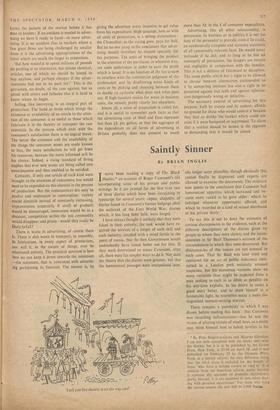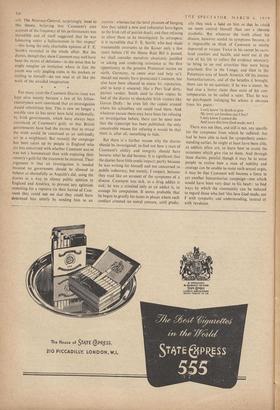Saintly Sinner
By BRIAN INGLIS
T HAVE been reading a copy of The Black 'Diaries,* an account of Roger Casement's life incorporating some of his private and public writings. In it are printed for the first time two of three diaries which have been circujAting in typescript for several years; copies, allegedly, of diaries found in Casement's former lodgings after the outbreak of the First World War; diaries which, it has long been held, were forged.
1 have always thought it unlikely that they were faked in their entirety; the task would have re- quired the services of a forger of such skill and such industry, coupled with a mind fertile to the point of mania, that the then Government would undoubtedly have found better use for him. If they were determined to smear Casement, after all, there were far simpler ways to do it. Nor does the theory that the diaries were genuine, but that the homosexual passages were interpolated later, - any longer seem plausible; though obviously this cannot finally be disproved until experts are allowed to examine the documents. The evidence now points to the conclusion that Casement had homosexual appetites, which increased and be- came more varied as he grew older : which he indulged whenever opportunity offered; and Which he recorded in a kind of sexual shorthand in his private diary: To say this is not to deny the existence of curious' discrepancies in the evidence, such as the different descriptions of the diaries given by ,people to whom they were shown, and the incon- sistencies in Sir Basil Thomson's account of the circumstances in which they were discovered. But discrepancies of this nature are not unusual in such cases. That Sir Basil was later tried and convicted for an act of public indecency com- mitted in a London park naturally aroused suspicion; but his numerous versions show no more variation than might be expected from a man seeking to cash in as often as poSsible on his war-time exploits. In his desire to make a good story better, and to show himself in a favourable light, he resembles many a more dis- tinguished memoir-writing warrior.
There remains a possibility to which I was drawn before reading this book : that Casement was recording hallucinations—that he was the victim of alluring visions of small boys, as a monk may think himself host to naked lovelies in his * By Peter Singleton-Gates and Maurice Girodias. I am not here concerned with the book; only with the diaries; but it is to be published by the Grove Press, New York, at $7.50 on April 28, and it was published on February 23 by the Olympia Press, Paris, in a limited edition; the only difference being that the third diary is included for the benefit of those 'who have a serious reason to read it.' It is omitted from the American edition, partly because it contains dry accounts of domestic expenditure, partly because 'it is too excessive in tone when deal- ing with personal experiences.' For those who have the serious reason, the cost will he 5,000 franca. cell. The Attorney-General, surprisingly, leant to this theory, believing that 'Casement's own account of the frequency of his performances was incredible and of itself suggested that he was labouring under a hallucination in this respect' —this being the only charitable opinion of F. E. Smith's recorded in the whole affair. But the diaries, though they show Casement may well have been the victim of delusions—in the sense that he might imagine an invitation where in fact the youth was only jingling coins in his pockets or smiling to himself—do not read at all like the work of the unaided imagination.
* *
For many years the Casement Diaries issue was kept alive mainly because a few of his fellow- countrymen were convinced that an investigation would rehabilitate him. This is now no longer a tenable view (it has never been held, incidentally, by Irish governments, which have always been convinced of Casement's guilt; so that British governments have had the excuse that to reveal the truth would be construed as an unfriendly act to a neighbour). But recently the campaign has been taken up by people in England who are less concerned with whether Casement was or was not a homosexual than with expiating their country's guilt for the treatment he received. Their argument is that an investigation is needed because no government should be allowed to behave as shamefully as Asquith's did, using the diaries as a way to silence public opinion in England and America, to prevent any agitation mounting for a reprieve (in their hatred of Case- ment they could not see that they could have destroyed him utterly by sending him to an asylum : whereas for the brief pleasure of hanging him they added a new and influential hero-figure to the Irish roll of patriot dead), and then refusing to allow them to be investigated. In retrospect, it is incredible that F. E. Smith, who had made • treasonable overtures to the Kaiser only a few years before Cif the Home Rule Bill is passed, we shall consider ourselves absolutely justified in asking and rendering assistance at the first opportunity to the greatest Protestant nation on earth, Germany, to come over and help us'), should not merely have prosecuted Casement, but also have been allowed to smear his reputation, and to keep it smeared; like a Port Said dirty- picture vendor, Smith used to show copies he had of the diaries to shockable Irish visitors like Gavan Duffy : he even left the copies around where his schoolboy son could read them. And whatever excuse there may have been for refusing an investigation before, there can be none now that the typescript has been published; the only conceivable reason for refusing it would be that there is, after all, something to hide.
But there is a further reason why the diaries should be investigated; to find out how a man of Casement's ability and integrity should have become what he did became. It is significant that the diaries have little erotic impact; partly because he was writing for himself and not concerned to peddle indecency, but mainly, I suspect, because they read like an account of the symptoms of a disease. Casement was sick, as a drug addict is sick; he was a criminal only as an addict is, to assuage his compulsion. It seems probable that he began to gratify his tastes in places where such conduct aroused no moral censure, until gradu- ally they took a hold on him so that he could no more control himself than can a chronic alcoholic. But whatever the truth about his disease, however sordid its symptoms became, it is impossible to think of Casement as totally depraved or vicious. Twice in his career he sacri- ficed comfort and health, and went out at the risk of his life to collect the evidence necessary to bring to an end atrocities that were being practised; first in the Congo, and then in the Putumayo area of South America. Of his intense humanitarianism, and of the benefits it brought, there can be no question; if he was a sinner, he had also a better claim than most of his con- temporaries to be called a saint. That he was no psychopath indulging his whims is obvious from his poem : I only know 'tis death to give My love; yet loveless can I live?
I only know I cannot die
And leave this love God made, not I.
There was not then, and still is not, any specific for the symptoms from which he suffered; but had he been able to look for sympathetic under- standing earlier, he might at least have been able, as addicts often are, to learn how to avoid the occasions which give rise to them. And through these diaries, painful though it may be to some people to realise how a man of nobility and courage can be unable to resist such sexual urges, it may be that Casement will become a force in yet another humanitarian campaign—one which would have been very dear to his heart : to find ways by which the community can be induced to regard those who feel 'this love God made, not I' with sympathy and understanding, instead of with revulsion.



































 Previous page
Previous page